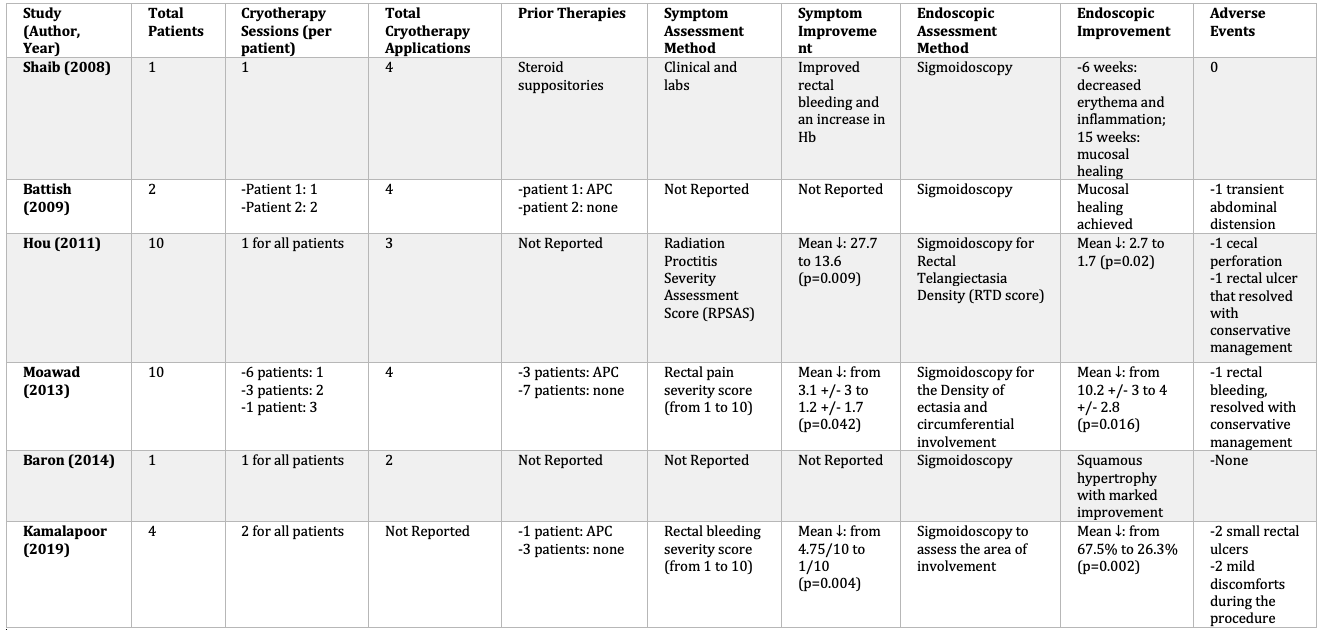Tuesday Poster Session
Category: GI Bleeding
P5211 - Cryotherapy in the Treatment of Radiation Proctitis: A Literature Review
Tuesday, October 28, 2025
10:30 AM - 4:00 PM PDT
Location: Exhibit Hall

Khalid Ahmed, MD (he/him/his)
University of Minnesota
Minneapolis, MN
Presenting Author(s)
Khalid Ahmed, MD1, Mohammad Adam, MD, MSc2, Madeline Marker, MS3, Abubaker Abdalla, MD4, Nicole Theis-Mahon, MLIS4, Nabeel Azeem, MD1, Ahmed Dirweesh, MD4, Stuart K. Amateau, MD, PhD4
1University of Minnesota, Minneapolis, MN; 2University of Missouri - Kansas City School of Medicine, Kansas City, MO; 3University of Minnesota Medical School, Minneapolis, MN; 4University of Minnesota Medical Center, Minneapolis, MN
Introduction: Radiation proctitis (RP) occurs in up to 20% of pelvic radiotherapy patients. While Argon Plasma Coagulation (APC) is standard therapy, it carries risks such as rectal pain, diarrhea, fistula, and stricture formation. Cryotherapy is a non-contact ablation method used in esophageal dysplasia, which is now being explored for RP. We conducted a comprehensive review of the available literature to evaluate the efficacy and safety of cryotherapy in managing bleeding secondary to RP.
Methods: A systematic literature search was conducted until May 2025, across five major databases: Medline, Embase, Scopus, Web of Science, and Cochrane CENTRAL. Studies reporting clinical or endoscopic data of cryotherapy in adult patients with radiation proctitis were included. A descriptive analysis of clinical symptom improvement and mucosal healing, with adverse events reported in the included studies, were summarized.
Results: Six studies encompassing a total of 28 patients, met the inclusion criteria. These studies included three case series and three case reports. As outlined in Table 1, most patients were male (n= 26; 93%), with a mean age of 69.9 years. Prostate cancer was the most common underlying malignancy, reported in 93% of cases. Liquid nitrogen was the cryogen used in nearly all patients (n=27; 96%), with carbon dioxide used in only one case. The majority of patients (n=19; 68%) underwent a single cryotherapy session. Prior treatment was reported in 4 studies with APC being the most common (n=5; 29.4%). Follow up period ranged from 11 to 105 days, with most patients followed up between 30 and 90 days. All of the included studies reported endoscopic improvement on follow up endoscopy. Four out of the six studies also reported clinical improvement in the form of bleeding or pain (Table 1.). One serious adverse event (AE) of a cecal perforation (n=1; 4%) was thought to be due to failure of the decompression tube. This patient required a right hemicolectomy. Remaining AE included rectal ulcers (n=3; 11%), transient abdominal distension (n=3, 11%), and rectal bleeding (n=1, 4%).
Discussion: Cryotherapy appears safe and effective for RP, offering clinical and endoscopic improvement with a favorable adverse event profile. Further prospective trials are warranted to assess efficacy and safety in the longterm.

Figure: Table 1. Summary of included studies evaluating endoscopic cryotherapy for radiation proctitis.
Disclosures:
Khalid Ahmed indicated no relevant financial relationships.
Mohammad Adam indicated no relevant financial relationships.
Madeline Marker indicated no relevant financial relationships.
Abubaker Abdalla indicated no relevant financial relationships.
Nicole Theis-Mahon indicated no relevant financial relationships.
Nabeel Azeem: Boston Scientific – Consultant.
Ahmed Dirweesh indicated no relevant financial relationships.
Stuart Amateau: BSC – Consultant. Cook – Consultant. Endo-Therapeutics – Consultant. Merit – Consultant. Olympus – Advisor or Review Panel Member, Consultant. Provation – Advisory Committee/Board Member. Steris – Consultant.
Khalid Ahmed, MD1, Mohammad Adam, MD, MSc2, Madeline Marker, MS3, Abubaker Abdalla, MD4, Nicole Theis-Mahon, MLIS4, Nabeel Azeem, MD1, Ahmed Dirweesh, MD4, Stuart K. Amateau, MD, PhD4. P5211 - Cryotherapy in the Treatment of Radiation Proctitis: A Literature Review, ACG 2025 Annual Scientific Meeting Abstracts. Phoenix, AZ: American College of Gastroenterology.
1University of Minnesota, Minneapolis, MN; 2University of Missouri - Kansas City School of Medicine, Kansas City, MO; 3University of Minnesota Medical School, Minneapolis, MN; 4University of Minnesota Medical Center, Minneapolis, MN
Introduction: Radiation proctitis (RP) occurs in up to 20% of pelvic radiotherapy patients. While Argon Plasma Coagulation (APC) is standard therapy, it carries risks such as rectal pain, diarrhea, fistula, and stricture formation. Cryotherapy is a non-contact ablation method used in esophageal dysplasia, which is now being explored for RP. We conducted a comprehensive review of the available literature to evaluate the efficacy and safety of cryotherapy in managing bleeding secondary to RP.
Methods: A systematic literature search was conducted until May 2025, across five major databases: Medline, Embase, Scopus, Web of Science, and Cochrane CENTRAL. Studies reporting clinical or endoscopic data of cryotherapy in adult patients with radiation proctitis were included. A descriptive analysis of clinical symptom improvement and mucosal healing, with adverse events reported in the included studies, were summarized.
Results: Six studies encompassing a total of 28 patients, met the inclusion criteria. These studies included three case series and three case reports. As outlined in Table 1, most patients were male (n= 26; 93%), with a mean age of 69.9 years. Prostate cancer was the most common underlying malignancy, reported in 93% of cases. Liquid nitrogen was the cryogen used in nearly all patients (n=27; 96%), with carbon dioxide used in only one case. The majority of patients (n=19; 68%) underwent a single cryotherapy session. Prior treatment was reported in 4 studies with APC being the most common (n=5; 29.4%). Follow up period ranged from 11 to 105 days, with most patients followed up between 30 and 90 days. All of the included studies reported endoscopic improvement on follow up endoscopy. Four out of the six studies also reported clinical improvement in the form of bleeding or pain (Table 1.). One serious adverse event (AE) of a cecal perforation (n=1; 4%) was thought to be due to failure of the decompression tube. This patient required a right hemicolectomy. Remaining AE included rectal ulcers (n=3; 11%), transient abdominal distension (n=3, 11%), and rectal bleeding (n=1, 4%).
Discussion: Cryotherapy appears safe and effective for RP, offering clinical and endoscopic improvement with a favorable adverse event profile. Further prospective trials are warranted to assess efficacy and safety in the longterm.

Figure: Table 1. Summary of included studies evaluating endoscopic cryotherapy for radiation proctitis.
Disclosures:
Khalid Ahmed indicated no relevant financial relationships.
Mohammad Adam indicated no relevant financial relationships.
Madeline Marker indicated no relevant financial relationships.
Abubaker Abdalla indicated no relevant financial relationships.
Nicole Theis-Mahon indicated no relevant financial relationships.
Nabeel Azeem: Boston Scientific – Consultant.
Ahmed Dirweesh indicated no relevant financial relationships.
Stuart Amateau: BSC – Consultant. Cook – Consultant. Endo-Therapeutics – Consultant. Merit – Consultant. Olympus – Advisor or Review Panel Member, Consultant. Provation – Advisory Committee/Board Member. Steris – Consultant.
Khalid Ahmed, MD1, Mohammad Adam, MD, MSc2, Madeline Marker, MS3, Abubaker Abdalla, MD4, Nicole Theis-Mahon, MLIS4, Nabeel Azeem, MD1, Ahmed Dirweesh, MD4, Stuart K. Amateau, MD, PhD4. P5211 - Cryotherapy in the Treatment of Radiation Proctitis: A Literature Review, ACG 2025 Annual Scientific Meeting Abstracts. Phoenix, AZ: American College of Gastroenterology.

